
denture care instructions pdf
Proper denture care is essential for maintaining oral hygiene, ensuring comfort, and preventing complications․ A consistent cleaning routine helps remove plaque, bacteria, and food particles, ensuring a healthy mouth environment․ Regular maintenance ensures proper fit and longevity of dentures․
Importance of Proper Denture Maintenance
Proper denture maintenance is crucial for ensuring comfort, preventing complications, and extending the life of your dentures․ Neglecting denture care can lead to the buildup of plaque, bacteria, and stains, which may cause bad breath, gum irritation, and systemic diseases․ Regular cleaning and rinsing help maintain oral hygiene, preventing infections and ensuring a fresh, clean mouth․ Proper maintenance also ensures a secure fit, reducing the risk of discomfort or sores․ Over time, changes in the mouth, such as bone loss or gum shrinkage, can affect how dentures fit․ Regular checkups with a dentist can address these issues early, preventing more severe problems․ By prioritizing denture care, you protect not only your dentures but also your overall health and well-being․ Consistent maintenance ensures your dentures remain functional, comfortable, and aesthetically pleasing for years to come․
Overview of Denture Care Instructions
Denture care instructions are designed to help you maintain the health, comfort, and longevity of your dentures․ Proper care involves daily cleaning, soaking, and regular dental checkups․ Daily routines include brushing your dentures with a soft toothbrush and mild soap, followed by rinsing with warm water․ Soaking dentures overnight in water or a cleaning solution helps remove plaque and stains․ It’s important to avoid harsh chemicals, abrasive cleaners, and hot water, as these can damage the denture material․ Regular dental visits ensure your dentures fit properly and address any oral health issues early․ Proper storage, such as keeping dentures in a denture bath or soaking solution, prevents them from drying out or warping․ Adhering to these guidelines helps maintain a healthy mouth environment, prevents bad breath, and ensures your dentures function optimally for years․ Consistent care routines are essential for both your dentures and overall well-being․
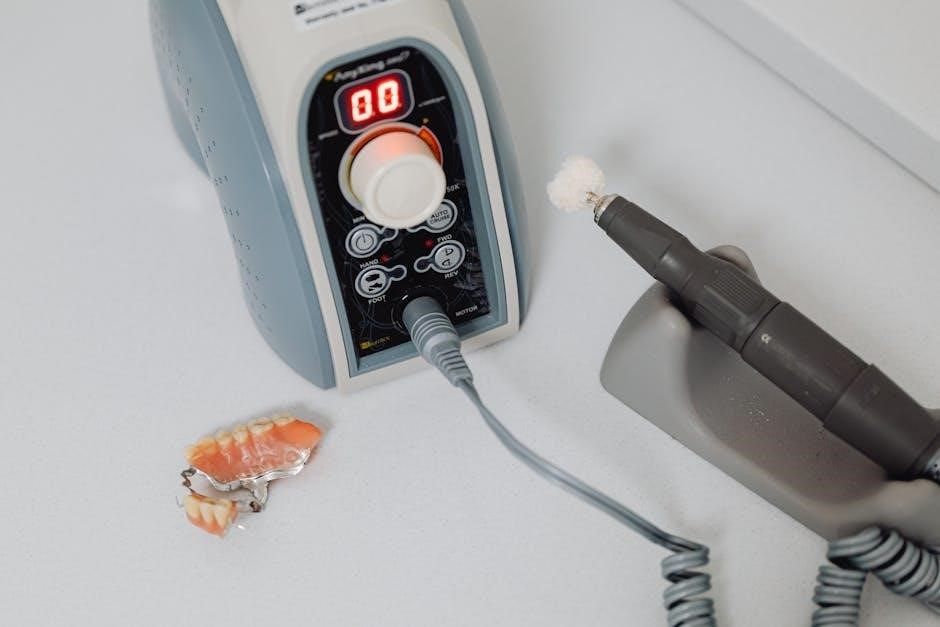
Cleaning Your Dentures
Cleaning your dentures involves using a soft toothbrush and mild soap with warm water to remove plaque and food particles․ Rinse thoroughly after meals to prevent debris buildup and maintain hygiene․
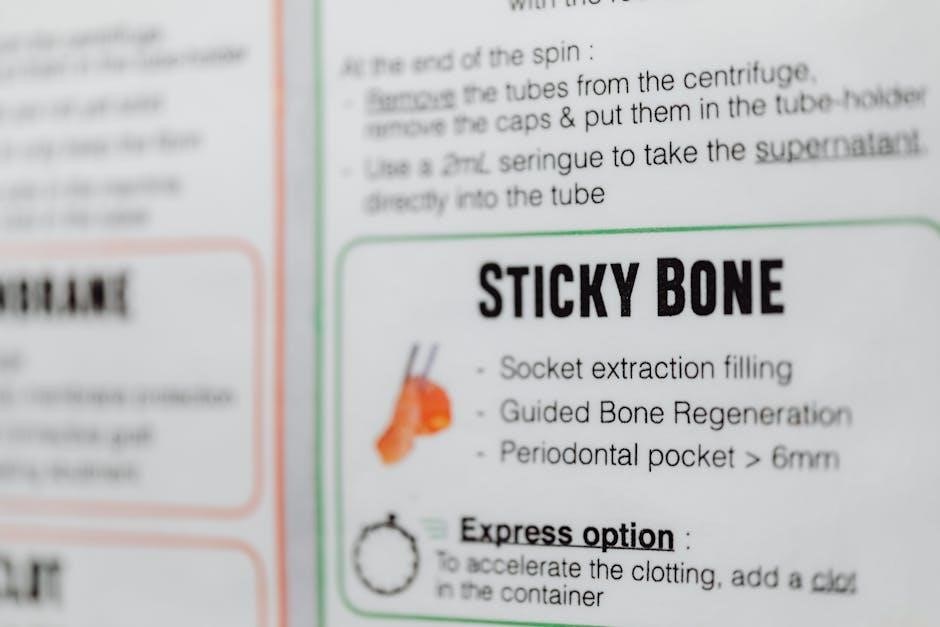
Daily Cleaning Routine
A daily cleaning routine is crucial for maintaining denture hygiene and comfort․ Start by rinsing your dentures under warm water to remove loose food particles․ Use a soft-bristled toothbrush or a denture brush with mild liquid soap or denture paste to gently scrub all surfaces, paying attention to areas where the denture meets your gums․ Avoid using regular toothpaste, as it can scratch the denture material․ After brushing, rinse thoroughly with warm water to ensure all soap and debris are removed․ Additionally, rinse your dentures after every meal to prevent plaque buildup․ For optimal care, soak your dentures overnight in water or a denture-soaking solution to keep them moist and clean․ Always store dentures in a protective case when not in use to prevent damage․ Consistency in this routine will help maintain a healthy mouth environment and extend the life of your dentures․
Using Denture Cleaning Solutions
Denture cleaning solutions are essential for effectively removing plaque, bacteria, and stains․ Soaking dentures in solutions like Polident or Efferdent can help maintain their cleanliness and prevent bad breath․ Always follow the manufacturer’s instructions for proper use․ Soak dentures in the solution overnight or as recommended to ensure thorough cleaning․ Avoid using harsh chemicals or abrasive materials, as they can damage the denture material․ After soaking, rinse the dentures thoroughly with warm water before reinserting them․ Regular use of these solutions complements daily brushing and helps maintain a healthy oral environment․ For optimal results, combine soaking with gentle brushing using a soft-bristled brush and mild soap․ This dual approach ensures dentures remain clean, functional, and comfortable for long-term use․

Brushing Techniques and Tools

For effective denture care, use a soft-bristled toothbrush or a denture brush to clean all surfaces gently․ Avoid using regular toothpaste, as it can be abrasive; instead, opt for mild liquid soap or a denture-specific cleaner․ Brush your dentures after every meal to remove food particles and plaque․ Hold the denture firmly and clean each area, including the gums, tongue, and palate, to ensure a fresh mouth feel․ Use warm running water to rinse thoroughly, preventing residue buildup․ For stubborn stains or plaque, soak the dentures in a cleaning solution before brushing․ Regular brushing helps maintain the denture’s appearance and prevents odors․ Always rinse your dentures before reinserting them to ensure a clean fit․ By incorporating consistent brushing into your daily routine, you can keep your dentures in excellent condition and promote overall oral health․
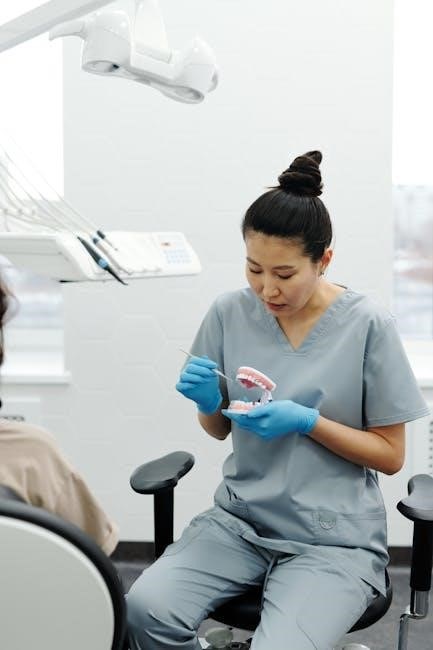
Storing Your Dentures
Store dentures in cold water or a denture-soaking solution to prevent drying out․ Always keep them in a denture bath or protective case when not in use to maintain shape and hygiene․
Overnight Storage Options

Proper overnight storage is crucial to maintain denture hygiene and shape․ Soak dentures in cold water or a denture-soaking solution to prevent drying out and distortion․ Use solutions like Polident or Efferdent as directed to remove plaque and stains․ Always store dentures in a protective case or denture bath to avoid accidental damage․ Avoid leaving dentures exposed to air, as this can cause warping․ For added cleaning, enzymatic solutions can be used weekly to deep clean and sanitize․ Ensure dentures are rinsed thoroughly before soaking to remove loose debris․ Following these steps ensures dentures remain clean, fitted, and functional․ Regular overnight care helps maintain oral health and extends denture lifespan․
Travel Tips for Denture Storage
When traveling, store dentures securely to avoid damage or loss․ Use a protective denture case or container with a lid to keep them safe․ Soak dentures in a travel-sized denture bath or solution to maintain hygiene․ Pack a small cleaning kit with a soft-bristled brush, mild soap, and a denture cleaning solution․ Avoid storing dentures in checked luggage; keep them in a carry-on bag․ Dry dentures thoroughly before storing to prevent bacteria growth․ Consider packing a small towel for drying․ Always rinse dentures with water before reinserting after travel․ For extended trips, ensure you have enough cleaning supplies․ If using adhesives, carry extra strips in case of emergencies․ Check airline restrictions on liquids when carrying cleaning solutions․ Proper travel care ensures dentures remain clean, secure, and ready for use․ Safe storage during travel is essential for maintaining denture health and functionality;
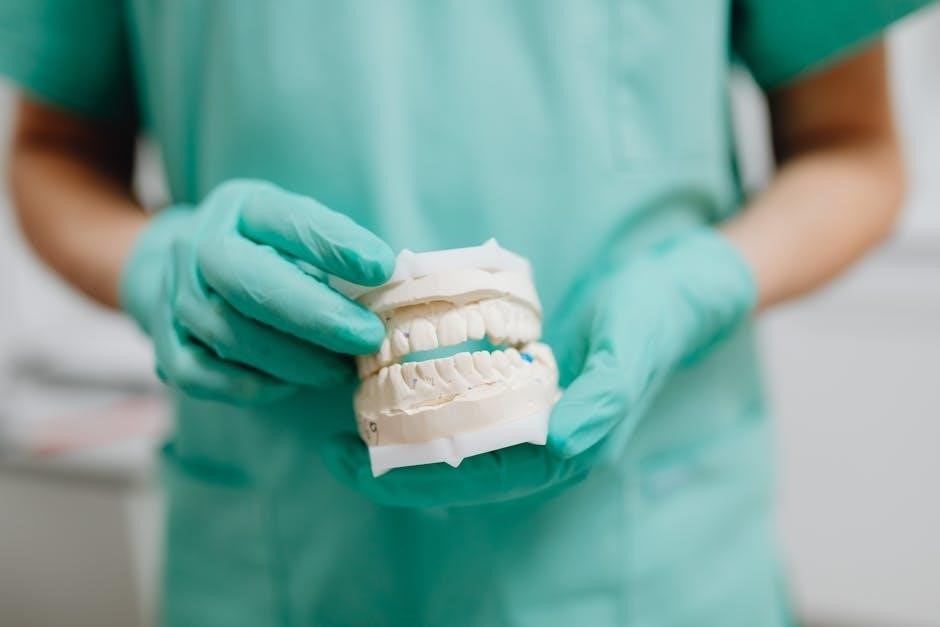
Maintenance and Checkups
Regular dental checkups ensure proper fit and function of dentures․ Annual inspections help address wear and tear, while professional cleanings prevent plaque buildup․ Adjustments and repairs maintain comfort and prevent complications over time․

Regular Dental Checkups
Scheduling regular dental checkups is crucial for maintaining the health and functionality of your dentures․ During these visits, your dentist will evaluate the fit, comfort, and overall condition of your dentures․ They will also assess your gums, tongue, and surrounding tissues to ensure there are no signs of irritation or infection․ Over time, changes in your mouth, such as bone loss or gum shrinkage, can affect how your dentures fit․ Your dentist can make necessary adjustments to ensure a proper fit and prevent issues like sore spots or instability․ Additionally, professional cleanings can remove stubborn plaque and stains that regular brushing might miss․ Regular checkups not only extend the life of your dentures but also contribute to your overall oral health and well-being․ By staying proactive, you can enjoy comfortable, functional dentures for years to come․
Addressing Common Issues
Common issues with dentures, such as a loose fit, irritation, or staining, can arise if proper care is not followed․ If your dentures feel loose, consult your dentist for adjustments to ensure a secure fit․ Irritation or sore spots can be caused by improper cleaning or poor fit, and should be addressed promptly to prevent infection․ Staining or discoloration can occur due to plaque buildup or certain foods; using a denture cleaning solution can help remove these stains․ If you notice persistent bad odors, ensure you are cleaning and rinsing your dentures thoroughly after meals․ Ignoring these issues can lead to more serious problems, such as gum inflammation or infections․ Regularly addressing these concerns will help maintain your comfort and the longevity of your dentures․ Always seek professional advice if issues persist, as your dentist can provide tailored solutions to ensure optimal oral health and denture function․
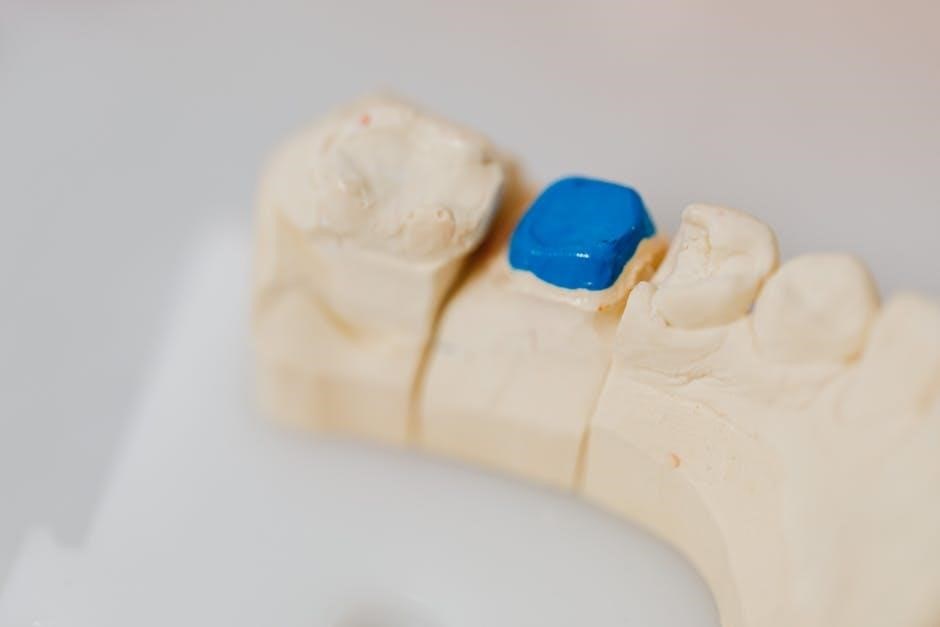
Additional Tips for Denture Wearers
Always rinse dentures after meals to remove food particles and prevent buildup․ Avoid using harsh chemicals, as they can damage denture materials․ Regularly using denture adhesives can improve comfort and stability․
Avoiding Harsh Chemicals
Using harsh chemicals on dentures can cause irreversible damage, such as discoloration or weakening of the materials․ Avoid exposing dentures to bleach, strong detergents, or abrasive cleaners, as these can harm the acrylic or metal components․ Instead, opt for mild soap and water or denture-specific cleaning solutions․ Always rinse dentures thoroughly after cleaning to remove any residue․ Never soak dentures in hot water, as this can warp or misshape them․ Additionally, avoid using toothpaste, as it can scratch the surface of the dentures․ By avoiding harsh chemicals, you protect your dentures from damage and ensure their longevity․ Always follow the manufacturer’s instructions for any cleaning products to maintain the integrity of your dentures․ Proper care ensures your dentures remain comfortable, functional, and aesthetically pleasing for years to come․
Importance of Rinsing After Meals
Rinsing your dentures after every meal is a crucial step in maintaining their cleanliness and your overall oral health․ Food particles and debris can easily accumulate on the surface of dentures, leading to plaque buildup and bad breath if not removed promptly․ By rinsing with warm water, you can effectively remove loose food residue and prevent the formation of stains․ This simple habit also helps maintain the freshness of your mouth and ensures a comfortable fit․ After rinsing, use a soft-bristled brush or denture brush with mild soap or a denture-specific cleaner to thoroughly clean all surfaces․ Avoid using toothpaste, as it can scratch the denture material․ Regular rinsing and cleaning prevent the accumulation of bacteria and odors, keeping your dentures in optimal condition․ This practice is essential for extending the lifespan of your dentures and maintaining a healthy, confident smile․
Dietary Considerations
Adapting your diet is essential for comfortable and effective denture wear․ Certain foods can damage dentures or make them less comfortable to wear․ Avoid sticky, hard, or crunchy foods like candies, nuts, and raw vegetables, as they can dislodge or scratch the dentures․ Opt for soft, easy-to-chew foods such as yogurt, cooked vegetables, and tender meats․ Cutting food into smaller pieces and chewing slowly can help reduce strain on your dentures․ Additionally, avoid biting directly into foods like apples or sandwiches, as this can cause uneven pressure․ A balanced diet rich in vitamins and minerals supports overall oral health and helps maintain the fit and function of your dentures․ Drinking plenty of water keeps your mouth moist and comfortable, while sugary or acidic foods should be limited to prevent potential damage․ By making thoughtful dietary choices, you can enjoy a comfortable and confident dining experience with your dentures․
Proper denture care is vital for maintaining oral health, comfort, and the longevity of your dentures․ By following these guidelines, you can prevent complications and ensure your dentures remain functional and comfortable for years․ Always consult your dentist for personalized advice․
Long-Term Benefits of Proper Care
Proper denture care significantly enhances oral health and overall well-being․ Regular cleaning and maintenance prevent plaque buildup, reducing the risk of bad breath, gum irritation, and infections․ Clean dentures also maintain their appearance and fit, boosting confidence․ Over time, consistent care slows bone loss and gum changes, ensuring dentures remain comfortable and functional․ Proper storage and use of cleaning solutions prevent warping and extend the lifespan of dentures․ By adhering to a daily routine and seeking regular checkups, individuals can enjoy long-term benefits, including better oral health, improved digestion, and a more enjoyable quality of life with their dentures․
Final Reminders for Denture Wearers
- Always clean dentures daily to prevent plaque buildup and bacteria growth․
- Use denture-specific cleaners or mild soap, avoiding harsh chemicals or abrasive toothpaste․
- Rinse dentures after meals to remove food particles and maintain hygiene․
- Store dentures in water or a soaking solution overnight to prevent drying and distortion․
- Attend regular dental checkups to ensure proper fit and address any oral health concerns․
- Avoid using hot water, as it can warp denture material․
- Never skip cleaning, as neglect can lead to stains and discomfort․
- Keep dentures in a protective case when not in use to prevent damage․
- Monitor changes in fit or comfort and consult your dentist promptly․
- By following these guidelines, you can enjoy optimal comfort, functionality, and longevity of your dentures․
Related posts:
Archives
Calendar
| M | T | W | T | F | S | S |
|---|---|---|---|---|---|---|
| 1 | ||||||
| 2 | 3 | 4 | 5 | 6 | 7 | 8 |
| 9 | 10 | 11 | 12 | 13 | 14 | 15 |
| 16 | 17 | 18 | 19 | 20 | 21 | 22 |
| 23 | 24 | 25 | 26 | 27 | 28 | 29 |
| 30 | 31 | |||||
Leave a Reply
You must be logged in to post a comment.